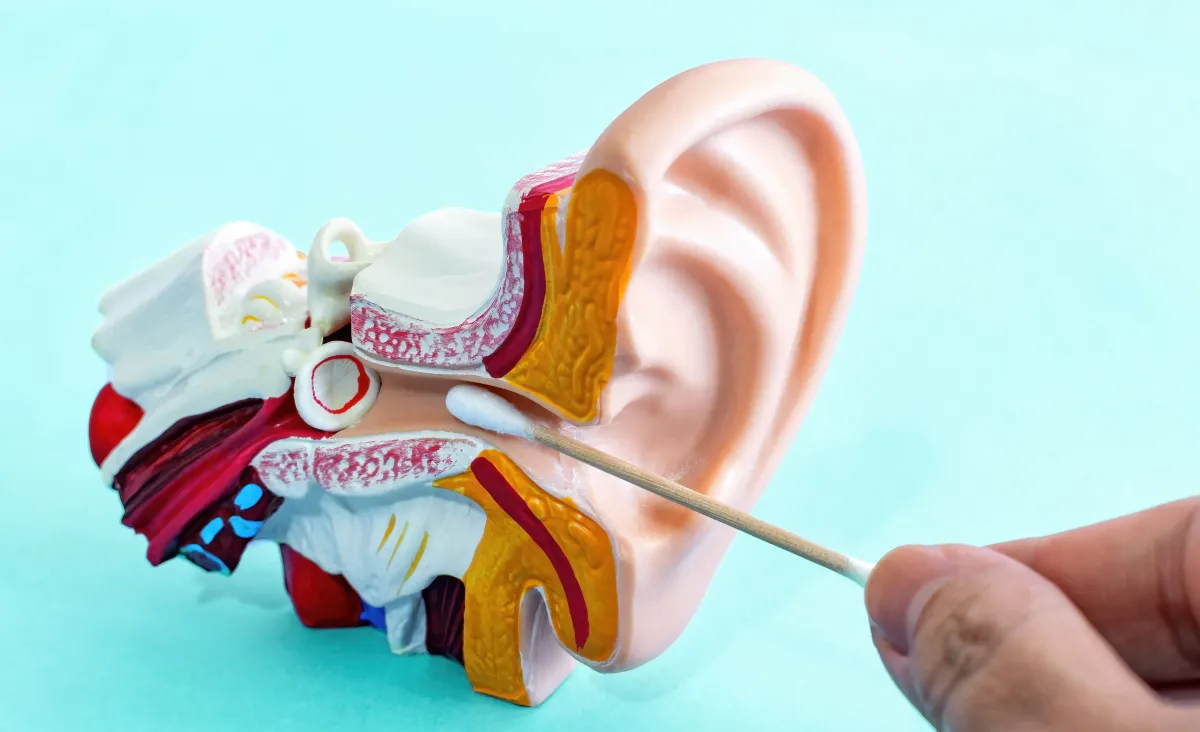Glue Ear : Gut Health
Glue ear is a condition where mucus builds up in the middle ear, causing hearing loss, often treated with antibiotics or grommet insertion.

Description of Glue ear:
Glue ear, also known as otitis media with effusion, is a condition characterized by the accumulation of mucus in the middle ear. This occurs when the Eustachian tubes, which connect the middle ear to the back of the throat, do not function properly.
The most common cause is inflammation or blockage around the tube openings, often due to abnormal bacterial flora in the upper respiratory tract, leading to excessive mucus production by the epithelial lining.
This condition can inhibit sound transmission because the presence of mucus in the middle ear dampens sound vibrations, leading to hearing impairment. This hearing loss can significantly affect a child's speech development and overall communication skills.
Glue ear is particularly common in children, though it can affect adults as well. The condition creates a favorable environment for infections, thus increasing the likelihood of repeated ear infections if left untreated. Treatment options typically include antibiotics and the surgical insertion of small ventilation tubes known as grommets to help drain the fluid and normalize hearing. However, these interventions primarily address symptoms rather than the underlying cause, such as the abnormal bacterial flora in the nose and throat.
Role of Gut Imbalances in Glue ear :
Gut imbalances, also known as gut flora disruptions, have been implicated in the development of glue ear, a condition characterized by the accumulation of fluid in the middle ear. This condition is particularly common in children and can result in hearing difficulties and recurrent ear infections.
Introduction:
Glue ear, or otitis media with effusion (OME), is a condition where the middle ear fills with sticky fluid. Normally, the Eustachian tube connects the middle ear to the back of the nose and helps maintain pressure balance and drainage. When this tube becomes blocked, fluid accumulates, leading to glue ear. Although often deemed a simple childhood illness, recent insights reveal a more complex interplay involving gut health.
Role of Gut Imbalances: Gut imbalances refer to deviations in the normal composition of gut microbiota. These imbalances can adversely affect other microbial communities—such as those in the throat and nose—due to interconnected environments and immune system interactions. When normal gut flora is disrupted, it can contribute to food allergies and broadly affect immune system functioning, conditions that are risk factors for glue ear. Specifically, when there is abnormal bacterial presence or overgrowth in the throat, it can lead to inflammation and block the Eustachian tube, resulting in fluid build-up and glue ear.
Addressing Gut Imbalances: To counteract these imbalances, dietary modifications can be instrumental. Removing certain foods that might exacerbate allergies or inflammation, and incorporating probiotics to restore healthy gut flora, can help in reducing the incidence of glue ear. Probiotics support the growth of beneficial bacteria, which may help prevent throat inflammation, thus reducing blockage issues and subsequent fluid accumulation in the middle ear.
Conclusion: Addressing gut health can be a strategic approach to manage and potentially prevent glue ear. While further research is needed to deeply understand these connections, current findings suggest that emphasizing balanced gut flora could serve as an additional preventive strategy against glue ear, alongside traditional medical approaches.
Restore Gut Function and Ease Symptoms of Glue ear:
Glue ear, known medically as otitis media with effusion, is a condition where fluid accumulates in the middle ear without any signs of infection. It often results in hearing difficulties and can be uncomfortable. Restoring gut function can be an effective strategy to ease symptoms of glue ear, as a healthy gut can influence overall immune function and reduce inflammation.
1. Diet Modification: To start addressing glue ear by improving gut health, it's crucial to modify the diet to eliminate foods that promote the growth of harmful bacteria, such as sugars, milk, and processed carbohydrates. These foods can exacerbate the balance of gut flora and potentially worsen glue ear symptoms.
2. Incorporate Probiotics: Adding probiotics can also be beneficial. A strong therapeutic probiotic can help restore healthy gut flora and improve immune response. It's recommended to give probiotics directly to children by incorporating them into their food and by placing powdered probiotics from a capsule onto the child's tongue before bedtime. This method helps introduce beneficial bacteria to the mouth and throat, potentially reducing pathogenic flora that might contribute to ear infections.
3. Address Food Allergies: Food allergies are also linked to ear infections and glue ear. Eliminating foods that a child is allergic to, especially common culprits like cow's milk, may help reduce symptoms. By improving gut flora with dietary changes and probiotics, you can help heal the gut lining and potentially reduce allergies over time.
4. Immediate Care for Ear Infections: Instead of relying on antibiotics, which may offer short-term relief but can exacerbate issues in the long run by disturbing the gut microbiome, consider natural remedies. Keeping the child warm, providing hot drinks with lemon and honey, and maintaining a consistent routine with probiotics can offer comfort and aid recovery. In conclusion, resolving glue ear through gut health involves a multi-faceted approach focusing on diet modifications and probiotic integration. While these methods require patience and consistency, they not only address the immediate symptoms of glue ear but also contribute to the long-term health of the child's immune system by restoring balance to the gut microbiome.
